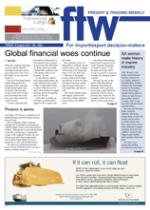In physics it’s called
“displacement”. Press down
on water or a soft substance
and the volume will relocate
by spilling or bulging
elsewhere. The political
upheavals sweeping the
Middle East this year have
had just such an effect on
the global citrus industry, to
the advantage of SA growers
and perishables shippers.
It seems the political crisis
in the Middle East earlier in
the year has had a knock-on
effect in certain markets, as
citrus could not be shipped
out of that area during the
turmoil. In both Russia and
the Middle East there are
reports of very late Egyptian
shipments that coincided
with the early South African
orange shipments,” said
Justin Chadwick, CEO of the
Citrus Growers’ Association
in a recent weekly newsletter
sent to citrus growers.
With Moroccan citrus also
straggling to regional
and world markets,
SA product has
been sought
to fill the gap
in the region.
Chadwick
reported that
as of mid-July,
year-to-date SA
citrus shipments to
the Middle East increased
from 25% of citrus exports
in 2010 (3.5m 15kg cartons)
to 28% of total in 2011 (4m
cartons). The Russian market
has also seen increased
imports of SA lemons,
grapefruit and soft citrus.
Displacement of fruit
from other nations by SA
product in Asia will have to
occur through marketing and
old-fashioned salesmanship
touting the superiority of SA
fruits. While Asia remains
a tantalising market for SA
citrus exports, for now
the Far East represents the
smallest destination for
SA fruits amongst global
markets. According to the
Perishable Products Export
Control Board, in the case of
SA oranges, Far East nations
have imported less than 6%
of shipment volumes thus far
this year compared to 7%
for the UK alone and 29%
for Northern Europe, SA’s
largest citrus importer. To
boost sales, the Department
of Trade and Industry
is sponsoring a meeting
room at the continent’s
big trade show – AsiaFruit
Logistica in Hong Kong –
in September to allow SA
citrus growers to tout their
wares for potential buyers.
The results of a “South
African Grapefruit
Challenge” held in May
this year may provide
marketing pitch points: 65
UK women who consumed
one SA grapefruit a day for
two weeks found the white
variety “naturally sweeter”
than counterparts from
elsewhere, so no added sugar
was needed. SA pink and
ruby varieties, which the
CGA says are growing more
popular in Asia, have even
higher natural sugar content.
Global political upheavals benefit SA citrus exports
05 Aug 2011 - by James Hall
0 Comments
FTW - 5 Aug 11

05 Aug 2011
05 Aug 2011
